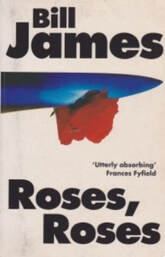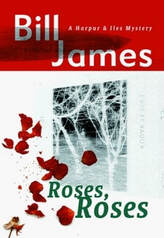When she was killed by three chest knife blows in a station car park, Megan Harpur had been on her way home to tell her husband she was leaving him for another man.

But, as that alarming opening sentence shows in its juxtaposition, Megan’s important internal decision is interrupted by a fateful, fatal external act: while moving her purchases to the car in a deserted, dark car park, an anonymous man attacks her and leaves her for dead. It’s the brilliance of Roses, Roses – which I feel is the author’s most haunting and resonant work in an already remarkable series – that the moment of violence is the beginning and not the climax of Megan’s tale. Told in alternating chapters and fluid in time, we spend half of the book with Megan on her last day alive, witnesses to her doubts, fears, and excitement as she considers a new life and a chance to be happy once more. The other chapters (mostly the odd-numbered ones) follow Colin Harpur as he contends with his colleagues and his two daughters while going around officialdom to call in favors and find his wife’s killer.
Bill James’s books always demonstrate a keen interest in the psychology of deeply flawed people, which is often the most interesting kind of people to study. But I think Roses, Roses reaches a new, deeply human level for the author. What could have been a gimmick – killing off the main character’s wife – in James’s hands becomes a compelling reason to fully explore the couple’s troubled relationship and their complicated, messy motivations (often selfish and personal, sometimes surprisingly thoughtful and generous).
From the previous stories, we have come to know Megan Harpur largely through the eyes of her husband. She hosts a book discussion club, she has grown increasingly restless with Colin’s affairs and the amorality and hypocrisy built into his police profession, and lately she has been looking for satisfaction in other quarters. (Assistant Chief Constable Iles and his wife Sarah play a similar, even more destructive game of extramarital conquests, including Sarah’s dalliance with Colin Harpur.) Here, we learn that Megan’s affair with London-based Tambo has grown increasingly serious, despite her concerns that settling down with another policeman might be a regretful lateral move. She already bristles against Tambo’s string-pulling to access an expensive, fully stocked flat for their trysts; the high-end frozen gourmet dinners seem especially insulting to Megan’s proletariat sensibilities.
Announcing her death from the start gives the author license to truly explore Megan Harpur as a person in those hours before. While the reader’s knowledge of her fate adds pathos to those moments, the cumulative portrait James paints of this character is full of details and touches that ring true: shopping in London, Megan chooses a linen tablecloth that will look great on the family table for Christmas, even though she plans to be gone by then; when she spots on the train the young man who will kill her, she is panicked by the hostility in his stare that she cannot understand and then wonders when he disappears whether she is still attractive enough to stir lustful thoughts in strangers. Megan’s perspective and persona are beautifully, elegiacally sustained through the novel as Bill James returns to her reality again and again, and with each brief chapter of a few pages we are given another few minutes of her life. The irony is that, for the reader, the minutiae and emotions of Megan Harpur’s last day take on a significance even more profound than that which the character manages for herself.

The alternating of past and present, the masterful, assured drawing out of both storylines, and the fully formed, very human examination of a smart, introspective woman at a crossroads who is ready to move on: Roses, Roses is a remarkable, memorable achievement, both as a crime story and as a literary novel. I wonder what Megan Harpur’s reading group would have made of it.
 RSS Feed
RSS Feed